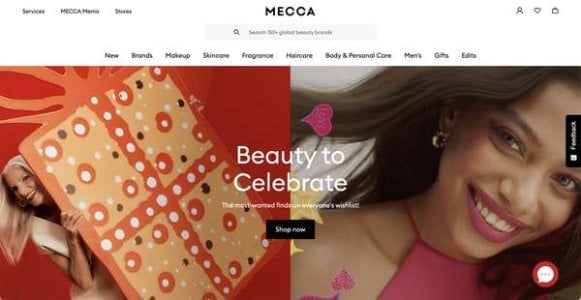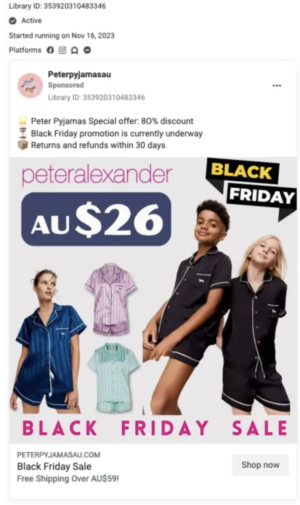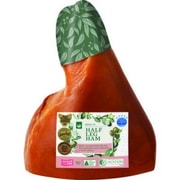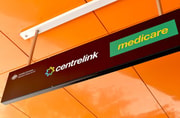Don't fall for it! Mecca is the latest beauty giant that's a victim of bogus Facebook and Instagram ads!
By
Seia Ibanez
- Replies 2
Ensuring your online shopping is secure is an important part of staying safe online, especially as scams and fraud become more frequent and sophisticated.
The latest victim of an online scam is Mecca, an Australian beauty giant whose customers were targeted by fake sales on social media.
One shopper and makeup lover named Julia, 41, was scrolling through her social media when she saw an advertisement from Mecca, a deal that seemed too good to be true.
The website she found showed discounts of up to 80 per cent and free shipping on orders over $59 when the 'Shop Now' button was clicked.
Clicking said link also took her to a nearly identical website (meccasale-au.com) with a completely identical logo to Mecca’s official website, including styling, product descriptions, and photos.
Unfortunately, the website was a complete fraud–it takes your order and payment details, but the products ordered won’t be delivered to you.
‘[I knew] it was fake right away as Mecca never had sales, and the prices were way too cheap to be real,’ Julia explained.
This website is one of dozens of fake online retailers targeting unsuspecting victims—with scammers cloning the websites of popular brands.
All of these schemes use the same tactic: scammers would create a blank Facebook page, use Meta Platform Inc.’s advertising platform, lure shoppers with cheap sales, direct them to the website, and simulate typical online shopping to get the user’s credit card details.
Once obtained, scammers may use them for fraudulent purchases or sell them to other people.
The fake Mecca website left very few clues, as the public records didn’t state the owner. Only the IP address is the clue, and a reverse IP address search revealed that over 400 websites are hosted on the same address—meaning they may be run by the same group or individual.
The domains were also registered on Alibaba Cloud, the registrar service of Alibaba–a Chinese E-commerce company.
The people behind the fake Mecca website also run other fake websites for Peter Alexander, Cotton On, Macpac, Asics, Seed, Oroton, Skechers, Timberland, and many more. These fake websites also use a similar design and promotions for discounted products.
Several URLs found in Meta’s advertising library are still featured on the platform. There is no information about how many users have seen these advertisements and how many were targeted.
These fake advertisements run from accounts with different names, like ‘Marylynne’ in the case of one fake Mecca advertisement. It was then later changed to a brand name before they posted the advertisement.
After being made aware of these fake ads, a Meta spokesperson said the company had removed the advertisements and the associated Facebook profiles.
‘We strongly encourage people to report content that may breach our rules so we can review and take the appropriate action,’ they said in an email.
But new advertisements with the same fake promotions appeared on the platform the next day.
Unfortunately, these types of fraud are a major problem in the country. According to the Australian Consumer and Competition Commission (ACCC), it received 2,760 reports of fake online stores from January to September this year, costing Australians $6.2 million.
But what makes this story so frustrating is how these scammers are using Meta’s advertising platform to target vulnerable consumers in an almost undetectable manner.
Despite Meta’s policies on prohibiting fraudulent activities, scammers rely on Meta to find their victims, and they are still free to post their fake websites on the said advertising platform.
Meta, as a middleman connecting the advertiser to its audience, appears to not have a clue once someone clicks another website through its platform.
On top of that, it is understood that Meta is also taking money from the fake retailer simultaneously with the real retailer (Mecca advertises through Meta).
Julia warned other online users on social media and said she was frustrated with Meta’s role in such a scam.
‘I feel there’s something going wrong in Meta’s vetting process, and they should be held responsible for anyone scammed by these ads,’ she complained.
As Black Friday and Cyber Monday sales are just around the corner, we urge you to stay vigilant as scammers will try to take advantage of people shopping online for the upcoming holiday season.
According to Catriona Lowe, Deputy Chair of the ACCC, she encouraged consumers to familiarise themselves with the site addresses of their favourite brands and head there directly to shop the sales. You can read more about the story here.
If you or someone you know is a victim of this type of fraud, it’s important to report it to the National Anti-Scam Centre’s website or call 000 and notify banks immediately. Stay safe, members!
 Members, have you encountered a fake website on your social media? How did you realise it was a fake one? Let us know in the comments below!
Members, have you encountered a fake website on your social media? How did you realise it was a fake one? Let us know in the comments below!
The latest victim of an online scam is Mecca, an Australian beauty giant whose customers were targeted by fake sales on social media.
One shopper and makeup lover named Julia, 41, was scrolling through her social media when she saw an advertisement from Mecca, a deal that seemed too good to be true.
The website she found showed discounts of up to 80 per cent and free shipping on orders over $59 when the 'Shop Now' button was clicked.
Clicking said link also took her to a nearly identical website (meccasale-au.com) with a completely identical logo to Mecca’s official website, including styling, product descriptions, and photos.
Unfortunately, the website was a complete fraud–it takes your order and payment details, but the products ordered won’t be delivered to you.
‘[I knew] it was fake right away as Mecca never had sales, and the prices were way too cheap to be real,’ Julia explained.
This website is one of dozens of fake online retailers targeting unsuspecting victims—with scammers cloning the websites of popular brands.
All of these schemes use the same tactic: scammers would create a blank Facebook page, use Meta Platform Inc.’s advertising platform, lure shoppers with cheap sales, direct them to the website, and simulate typical online shopping to get the user’s credit card details.
Once obtained, scammers may use them for fraudulent purchases or sell them to other people.
The fake Mecca website left very few clues, as the public records didn’t state the owner. Only the IP address is the clue, and a reverse IP address search revealed that over 400 websites are hosted on the same address—meaning they may be run by the same group or individual.
The domains were also registered on Alibaba Cloud, the registrar service of Alibaba–a Chinese E-commerce company.
The people behind the fake Mecca website also run other fake websites for Peter Alexander, Cotton On, Macpac, Asics, Seed, Oroton, Skechers, Timberland, and many more. These fake websites also use a similar design and promotions for discounted products.
Several URLs found in Meta’s advertising library are still featured on the platform. There is no information about how many users have seen these advertisements and how many were targeted.
These fake advertisements run from accounts with different names, like ‘Marylynne’ in the case of one fake Mecca advertisement. It was then later changed to a brand name before they posted the advertisement.
After being made aware of these fake ads, a Meta spokesperson said the company had removed the advertisements and the associated Facebook profiles.
‘We strongly encourage people to report content that may breach our rules so we can review and take the appropriate action,’ they said in an email.
But new advertisements with the same fake promotions appeared on the platform the next day.
Unfortunately, these types of fraud are a major problem in the country. According to the Australian Consumer and Competition Commission (ACCC), it received 2,760 reports of fake online stores from January to September this year, costing Australians $6.2 million.
But what makes this story so frustrating is how these scammers are using Meta’s advertising platform to target vulnerable consumers in an almost undetectable manner.
Despite Meta’s policies on prohibiting fraudulent activities, scammers rely on Meta to find their victims, and they are still free to post their fake websites on the said advertising platform.
Meta, as a middleman connecting the advertiser to its audience, appears to not have a clue once someone clicks another website through its platform.
On top of that, it is understood that Meta is also taking money from the fake retailer simultaneously with the real retailer (Mecca advertises through Meta).
Julia warned other online users on social media and said she was frustrated with Meta’s role in such a scam.
‘I feel there’s something going wrong in Meta’s vetting process, and they should be held responsible for anyone scammed by these ads,’ she complained.
As Black Friday and Cyber Monday sales are just around the corner, we urge you to stay vigilant as scammers will try to take advantage of people shopping online for the upcoming holiday season.
According to Catriona Lowe, Deputy Chair of the ACCC, she encouraged consumers to familiarise themselves with the site addresses of their favourite brands and head there directly to shop the sales. You can read more about the story here.
If you or someone you know is a victim of this type of fraud, it’s important to report it to the National Anti-Scam Centre’s website or call 000 and notify banks immediately. Stay safe, members!
Key Takeaways
- Beauty retailer Mecca was subject to fake ads on social media platforms owned by Meta Platforms Inc.
- An advertisement with an 80 per cent discount on Mecca products linked to a fraudulent website that collected payment details for no deliveries.
- Websites advertising significant discounts for Peter Alexander, Cotton On, Macpac, and others were all hosted on the same IP address and registered on Alibaba Cloud.
- Meta’s advertising platform was used to target and connect victims to these scams, with new fraudulent ads being created from fresh accounts even after the original ones were reported and removed.









